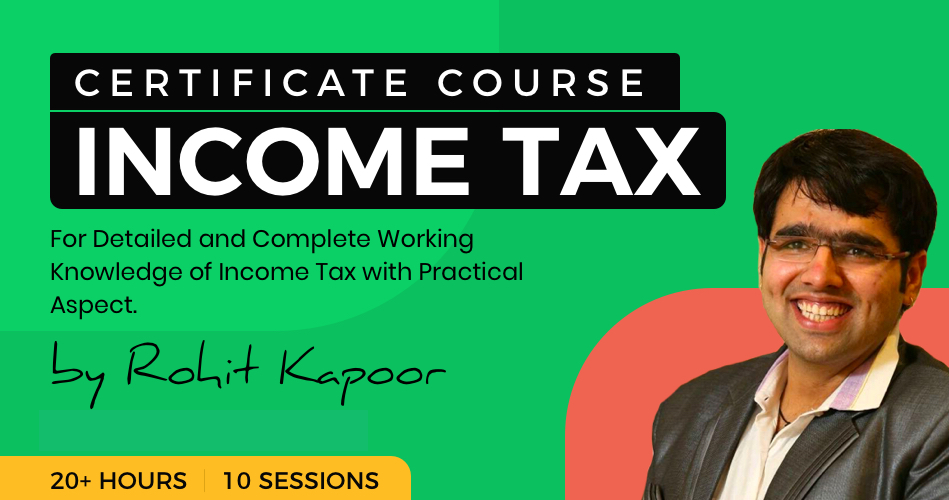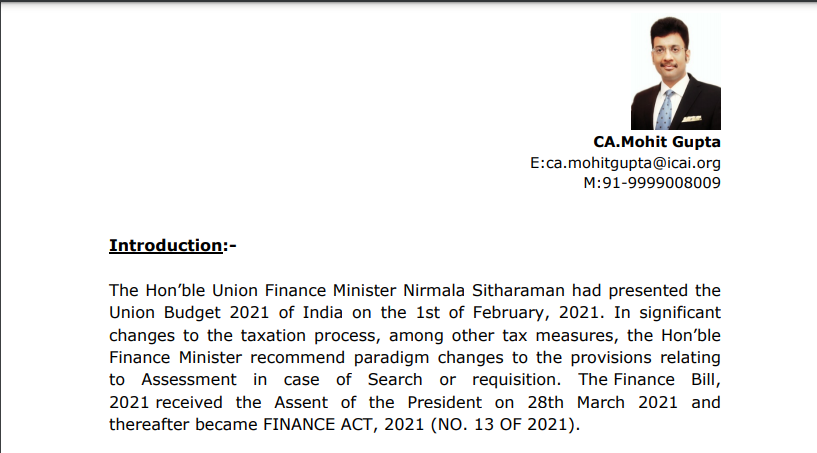New Regime of Income Tax Search and Seizure Assessments – Glaring Implications
Table of Contents
Introduction:-
The Hon’ble Union Finance Minister Nirmala Sitharaman had presented the Union Budget 2021 of India on the 1st of February, 2021. In significant changes to the taxation process, among other tax measures, the Hon’ble Finance Minister recommend paradigm changes to the provisions relating to Assessment in case of search or requisition. The Finance Bill, 2021 received the Assent of the President on 28th March 2021 and thereafter became FINANCE ACT, 2021 (NO. 13 OF 2021).
In this article, the author has attempted to highlight the significant changes brought in by the virtue of the Finance Act, 2021 in context to the Income Tax assessments to be made in pursuance to an Income Tax Search and Seizure Action conducted u/s 132 of the income tax Act,1961 and its implications thereupon.
Related Topic:
New Regime of Re-Assessment
Changes relating to Income Tax Search and Seizure Assessments brought in the statute by virtue of the Finance Act’2021:-
The Finance Act, 2021 has done away with the existing legal framework for Assessment in case of search or requisition (forming part of Chapter XIV of the Income Tax Act,1961- Procedure for Assessment) viz. Section 153A to 153D of the Income Tax Act,1961 in respect of search or requisition conducted on or after 1st April 2021. For searches conducted on or after 1st April 2021, then forth, assessments shall be framed under Section 147 read with section 148, 148A, 149,151 of the Income Tax Act, 1961.
While doing so, the reasons advanced in the memorandum explaining the provisions of Finance Bill, 2021 are that the existing search assessment framework ( like the erstwhile block assessment procedure under Chapter XIV-B of the Act) has failed to in its objective of early resolution of search assessments and were proving to be highly litigation-prone. As stated in the memorandum explaining the provisions of Finance Bill, 2021 which later on culminated into Finance Act, 2021, it is expected that the new system would result in less litigation and would provide ease of doing business to taxpayers as there is a reduction in time limit by which notice for assessment or reassessment or re-computation can be issued.
Necessary Changes made by the Finance Act 2021 in the Income Tax Act 1961
(Relevant changes only having a bearing on search and seizure assessments have been discussed here)
(a) Section 148 of the Income Tax Act 1961: “ Issue of Notice where income has escaped assessment”
The erstwhile Section 148 of the Income Tax Act’1961 has been substituted by a distinct Section 148 viz. “Issue of Notice where income has escaped assessment.”
Under the newly substituted Section 148, Explanation 2 has been brought into place to cover search, survey or requisition cases initiated or made or conducted, on or after 1st April 2021, wherein it shall be deemed that the Assessing Officer has information that suggests that the income chargeable to tax has escaped assessment in the case of the assessee for the three assessment years immediately preceding the assessment year relevant to the previous year in which the search is initiated or requisition is made or any material is seized or requisitioned or survey is conducted.
Related Topic:
Delhi HC in the case of Anju Jalaj Batra Versus National E-Assessment Centre
The relevant explanation 2 is reproduced herein under:-
“Explanation 2.—For the purposes of this section, where,—
(i) a search is initiated under section 132 or books of account, other documents or any assets are requisitioned under section 132A, on or after the 1st day of April 2021, in the case of the assessee; or
(ii) a survey is conducted under section 133A, other than under subsection (2A) or sub-section (5) of that section, on or after the 1st day of April 2021, in the case of the assessee; or
(iii) the Assessing Officer is satisfied, with the prior approval of the Principal Commissioner or Commissioner, that any money, bullion, jewellery or other valuable article or thing, seized or requisitioned under section 132 or section 132A in case of any other person on or after the 1st day of April 2021, belongs to the assessee; or
(iv) the Assessing Officer is satisfied, with the prior approval of Principal Commissioner or Commissioner, that any books of account or documents, seized or requisitioned under section 132 or section 132A in case of any other person on or after the 1st day of April 2021, pertains or pertain to, or any information contained therein, relate to, the assesse,
the Assessing Officer shall be deemed to have information which suggests that the income chargeable to tax has escaped assessment in the case of the assesse for the three assessment years immediately preceding the assessment year relevant to the previous year in which the search is initiated or books of account, other documents or any assets are requisitioned or survey is conducted in the case of the assesse or money, bullion, jewelry or other valuable article or thing or books of account or documents are seized or requisitioned in case of any other person.”
Related Topic:
Income Tax Search and Seizure
(b) Section 148A of the Income Tax Act’1961: “ Conducting inquiry, providing opportunity before issue of notice under Section 148”
The Finance Act’ 2021, inserted a new Section 148A which mandates that before issuance of notice under Section 148, the Assessing Officer shall conduct enquiries, if required, and provide an opportunity of being heard to the assesse. After considering his reply, the Assessing Officer shall decide, bypassing an order, whether it is a fit case for the issue of notice under section 148 and serve a copy of such order along with such notice on the assesse. The Assessing Officer shall before conducting any such enquiries or providing an opportunity to the assesse or passing such order obtain the approval of the specified authority.
Most important to note here is that this procedure of enquiry, providing opportunity and passing the order, before issuing notice under section 148 of the Act, shall not be applicable in search or requisition cases. {Emphasis Supplied}
(c) Section 149 of the Income Tax Act 1961: “Time limit for notice”
The erstwhile Section 149 of the Income Tax Act 1961 has been substituted by a distinct Section 149. The newly substituted Section provides that in normal cases, no notice shall be issued if three years have elapsed from the end of the relevant assessment year. However, notice beyond the period of three years from the end of the relevant assessment year but not beyond the period of ten years from the end of the relevant assessment year can be issued only in a few specific cases where the Assessing Officer has in his possession books of accounts or other documents or evidence which reveal that the income chargeable to tax, represented in the form of asset, which has escaped assessment amounts to or is likely to amount to fifty lakhs rupees or more for that year.
Interestingly, the first proviso to sub-section (1) of Section 149 provides that no notice under section 148 shall be issued at any time in a case for the relevant assessment year beginning on or before 1st day of April 2021, if such notice could not have been issued at that time on account of being beyond the time limit specified under the provisions of clause (b) of sub-section (1) of this section, as they stood immediately before the commencement of the Finance Act, 2021. The implication of this proviso is of wide import in search and seizure cases so far as to which all assessments years can be covered for assessment. The issue is discussed in the later part of this article.
Furthermore, the second proviso also clarifies that Section 149(1) shall not apply in cases where search has been initiated on or before 31st March’2021.
(d) Section 153A, 153B, 153C and 153D of the Income Tax Act 1961:
“Section 153A: Assessment in case of search or requisition” and Section 153C: Assessment of income of any other person” have been suitably amended by inserting a sunset clause so far as they shall cease to operate for searches initiated on or after 01st April 2021. Accordingly, “Section 153B: Time limit for completion of assessment under Section 153A” and “Section 153D: Prior approval necessary for assessment in case of search or requisition” shall also become otiose and thus not applicable for searches initiated on or after 01st April 2021.
Read & Download the full copy in pdf:
 CA Mohit Gupta
CA Mohit Gupta
Delhi, India
Mr. Mohit Gupta is a Fellow Member of the Institute of Chartered Accountants of India, a commerce graduate from prestigious Ramjas College, Delhi University, and alumni of St. Xavier’s School, New Delhi. He is practicing as a Chartered Accountant for more than 15 years and managing the Direct Tax Advisory and Litigation practice of M/s. Dhanesh Gupta & Co., Chartered Accountants, New Delhi a renowned Chartered Accountancy firm in the core domain of direct taxation established in 1978. He forte is handing Income Tax Search and Seizure matters, matters before the Income Tax Settlement Commission and other direct tax litigation matters. As of today, he has wide experience in handling Income Tax Search and Seizure Cases, representing matters before the Income Tax Settlement Commission, ITAT, and other appellate tribunals. He has been contributing articles in various professional magazines/journals and addressing various seminars on topics relating to Income Tax Search and Seizure, Income Tax Settlement Commission, and other allied tax matters. He has to his credit plethora of well-researched articles out of which many have appeared in leading journals. In Addition to the above, Mr. Mohit Gupta is a Special Auditor of the Income Tax Department and has carried out numerous Special Audits across the country on being appointed by the Income Tax Department which have plugged tax evasions, tax base erosion, and other tax manipulative practices and in turn, facilitated the Income Tax Department to collect huge tax revenues. Mr. Mohit Gupta has also been appointed as Special Auditor under other tax statutes and by other Investigation Agencies of the Government of India. Mr. Mohit Gupta, authored the periodical Newsletter on Income Tax Search and Seizure. The said newsletter contained well-researched write-ups/articles and judicial developments on the matters of Direct Taxation. The newsletter was circulated both electronically and otherwise. Recently, in the year 2016, Mr. Mohit Gupta has authored two comprehensive books on the Income Declaration Scheme’2016, titled as “Law Relating to Income Declaration Scheme’2016”. His books provided at one place the entire gamut of the Law relating the Income Declaration Scheme ‘2016 and set to rest all the queries that arose before, during, and after the course of making the declaration under the Income Declaration Scheme’2016. The books received an extremely overwhelming response from the readers including the proposed taxpayers, tax administration, tax professionals, corporate houses, and academicians. The said books were released by erstwhile Hon’ble Union Finance Minister, Shri. Arun Jaitley, Shri.Arjun Ram Meghwal, Minister of State for Finance and the Chairman of Central Board of Direct Taxes and many other dignitaries. Due to his continuous desire to always rise on the learning curve, he always has a quest and quenches to read more, learn more, and perform even more.









